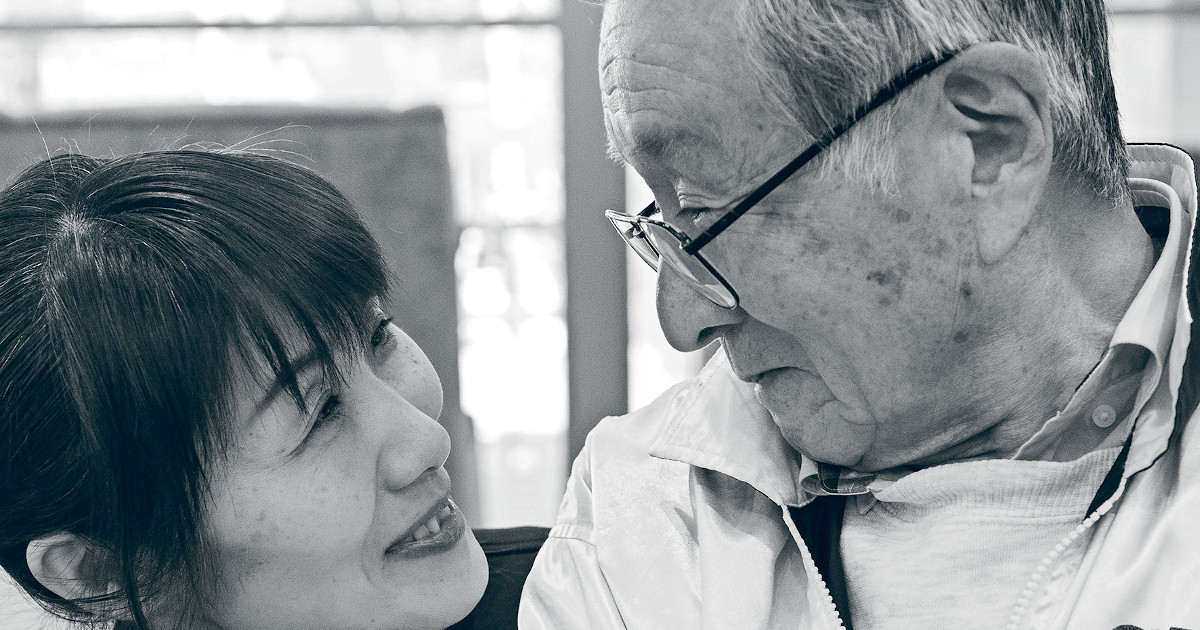Author Tom Borg says that the saddest distance between two people is misunderstanding. In fact, misunderstandings are the number one cause of problems. Sometimes it depends on the content of the words, sometimes on the way they are spoken and sometimes it depends on non-verbal communication.
For carers and the cared for, communication is further complicated by scarce time or generational differences. That’s why we show how professionals can communicate well with residents despite hurdles:
Influencing through language
Sandra Mantz has worked for many years as a ward manager in geriatric care. In the meantime, she has founded an academy and trains language skills. She encourages caregivers to question and improve communication. Professionals speak a lot and the profession could not be practised at all without speaking. Language becomes a profession, the expert explains. Those who speak have an influence on things. Besides the reputation of the house, oneself, the professional image, family and relatives, the communication expert lists points in which language influences care.

Communication expert Sandra Mantz
Conveying humanity
„Dignity and humanity“ – other points of influence – are concrete because they affect home residents personally. Everyone wants to be treated humanely and with dignity, that is clear. But what does that mean and how does it work? „Patient, forgiving, very personal, understanding, informative, advising, motivating, mediating, empathetic – everything that makes up being human,“ clarifies Mantz.
Competence or professionalism starts in communication when caregivers can communicate well with people who behave badly. If the caregiver manages to make the resident feel seen as human, he or she is more likely to calm down. The trainer advises to practice actively. „Because nobody becomes a professional if they only know something“. As an example, she mentions communicative role plays. In the meantime, there are also many training courses that can help.
Geriatric nurse Anette Jersak tells us from experience: „There are difficult residents and many are in an oppressive situation. We should accept them as they are“. Mantz sums it up: „If we – the carers – are not emphatic, who is?“
Reflect on language
Mindfulness in speaking starts with reflection. We often anger and provoke without realising it. Especially when things have to be done quickly – and that is often the case in care, Jersak clarifies. Mantz explains that we don’t do this consciously, „but because language in our professional field has become so cool, necessary and reduced that the human being hardly appears in it“. For the trainer, this realisation is key. Before professionals have the trouble, there are things they could do to prevent it from happening.
Practical sentences
Caregivers for the elderly should avoid the word „have to“ when talking to residents. Mantz explains that people – rightly – eventually become defiant if they always have to do something. Using phrases like „could you“ or „would you“ is more helpful for good communication. This way, residents can live their self-determination and do not feel like a task they still have to do.
Caregivers can also ask themselves: Are my sentences problem- or solution-oriented? The statement „I’ll put your jacket on so you don’t get cold“ alludes to the problem (cold). Whereas „I’ll put your jacket on so you stay nice and warm“ is oriented towards the solution. The first sentence makes the senior think of the cold and possibly raises concerns, whereas the second sentence promises care.
Create clarity
Good communication brings clarity between carer and resident. People can handle a lot of things well, but not irritating statements or when they feel they are not being taken seriously. Statements like „I’ll be right there“, „this will only take a moment“, „just a moment“ etc. are among these irritating statements.
The advice is: „Try to explain what the person being cared for should be prepared for“. If carers are not sure how long something will take, it is better not to mention a time, but sequences of actions. For example: „I have another phone call and then I will come to you“ or „After I have brought the papers to the office, I can take care of your request“. If you put this into practice, you will be amazed at how patient people can be, motivates the expert.


